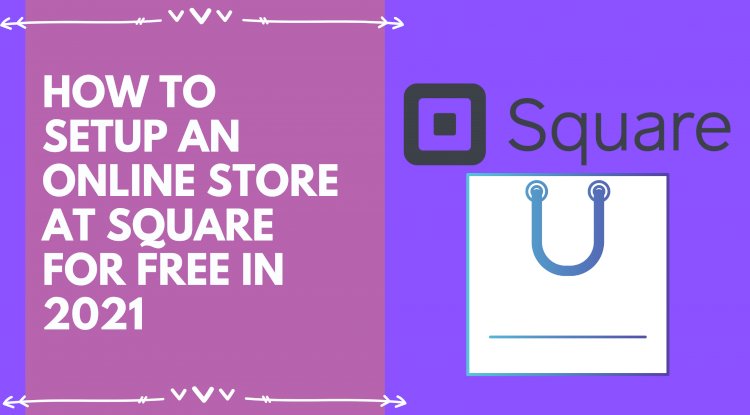How to Write a Blog for E-commerce in 2021: Everything you need to know about blogs for an eCommerce
Why should we blog for ecommerce sites? Blogging for ecommerce business is a powerful tool, mostly undermined by the people in the e-commerce business. It's imperative for them to understand how it can help to boost their promotion and sales too!

Online shopping is proving to be the new norm as time goes by. That doesn't come as a surprise, given the billions of people who use the internet and transforming even a portion of those potential customers to real ones could make you a lot of profits. It is most likely why you have gotten out of your way to creating an eCommerce site. What's next after that, and how do you drive traffic to your online store? There are high chances that someone has mentioned blogging.
Related: How to start an e-commerce business from scratch in 2021?
However, as a wise businessperson, you don't like jumping into a suggestion without researching its viability. That's why you are wondering whether you should add a blog to your eCommerce site or not. Fortunately, this article will guide you. It will make it easy to make that decision, no doubt. So, without further ado, let's discuss everything you need to know about blogs for eCommerce.
Contents
- What is an Ecommerce Blog?
- Do you need a blog for your eCommerce site?
- Why do you need to do eCommerce Blogging in 2021?
- Tips for successful Ecommerce Blogging
- Final Words
What is an Ecommerce Blog?
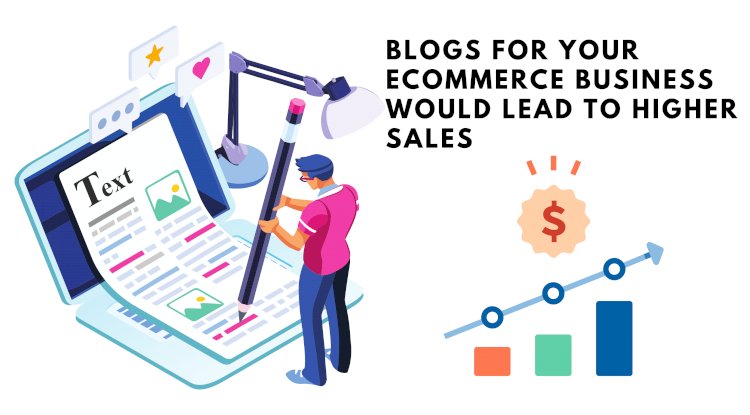
Like any other blog, it is a website where one or more authors publish content about a specific topic. However, unlike general blogs, they relate to the eCommerce site, especially about the business, service, or product. As much as some are on a separate site, most of them are segments on the main site.
Their primary topic is the product or service provided by the site. It has various benefits which will be discussed in the course of this article.
Do you need Blogs for your eCommerce Site?
First of all, it is essential to know whether you need a blog, to begin with, no doubt. It would be a lie to say that a blog is a requirement when coming up with a blog. Nevertheless, it is worth considering given the many benefits they bring aboard. Blogs could increase your eCommerce site traffic hence lead to relatively high sales. Consequently, the store owner will make huge profits. You are probably wondering how it does the trick, but let's look at some statistics. After all, numbers don't lie.
There are pretty many blog readers, and more than half the number shop online. Most online shoppers in the United States, 61% to be precise, become more confident about buying a product online upon reading its recommendations on a blog. 60% of online customers say that if a business has a website with unique blogs, it will make them feel entirely connected.
It takes from online shoppers, up to 47%, five blog posts to trust an eCommerce store. Going by such figures, you are in a better position to decide whether it is advisable to do eCommerce blogging in 2021.
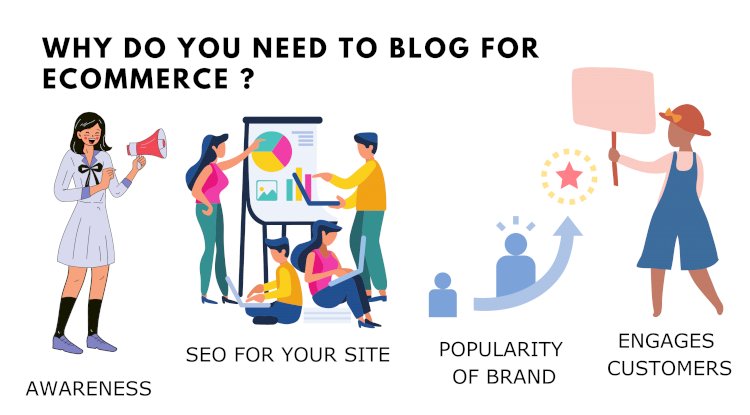
Why do you need to do eCommerce Blogging in 2021?
The main reason to have an eCommerce blog for your online store is to increase traffic, purchases, and profits. However, many factors lead to that. Below is a discussion of how your blog could help your eCommerce site become successful.
-
Creating awareness about the existence of your site
Upon creating an eCommerce site, there are high chances that only you and people close to you will know about it. Under such circumstances, how do you expect buyers to visit a site they don't even know exists? That's why you need to make it known, and blogging can help in this case. It is a huge opportunity that could help potential buyers find your site and its products. It is the first step to making a purchase, and that's promising. Sharing those blog posts will create awareness, and people will discover your site over time.
-
Search Engine Optimization (SEO)
Most people often look at the search results on the first page of the search engine most of the time. That's why every eCommerce site owner should thrive on being on top of the list. That's where blogging comes in handy. As you create more content, search index indexes the blog posts increasing your chances of ranking high. Consequently, potential customers will easily find you organically. Preferably, use appropriate keywords, and your eCommerce blogging will pay off, indeed.
Related: How to Rank for the Products that You sell for your E-commerce Business?
Search engines also use backlinks to determine which eCommerce site will rank higher than the other. Since the higher you rank, the greater the chances of reaching potential buyers, you need to consider them seriously. Other bloggers tend to link to blogs more than product descriptions. Therefore, having a blog for your eCommerce is an excellent strategy for improving search engine rank.
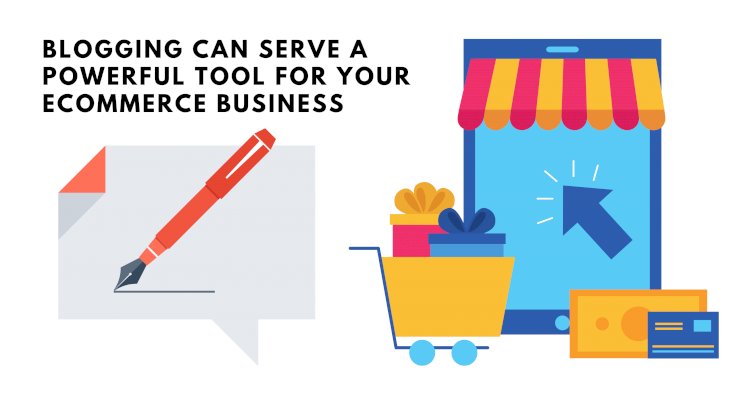
-
Familiarity and Popularity
It is no secret that there are many eCommerce sites available. How do you ensure that the name that comes to a customer's mind when considering shopping is that of your business? The answer is quite simple. You should ensure that they are familiar with your brand, whereas return visitors will increase if you are consistent. Besides that, ensure that the content is new and valuable to seem more informative than promotional. It also makes your online shop popular as people share blogs online via social media.
-
Attracting traffic from other sources
Blogging in eCommerce promotes sharing of blogs by other users. Once they share the links on Twitter, Facebook, Instagram, and other social media platforms, your blogs will reach more people. If those readers love them, they will buy from your site, and that's good for the business.
Related: 10 Social Media Marketing Strategies for your Online Business
People are often promoting their eCommerce to increase traffic. Most of the owners pay for promotions, which may not be something you can afford initially. Equally important, why spend on something that you can get for free? That's where blogging comes in since it is free and serves the purpose of marketing your site. Marketing a platform increases traffic that could result in sales.
Related: What is Inbound Marketing? The Ultimate guide to Inbound Marketing Strategy for E-commerce Business
-
It engages customers
If you build an eCommerce site, people will visit it only when buying something. However, if there is a blog, they will see it often to learn a thing or two. You could share success stories of the products, guides of using them, and even benefits of the product or service. Such information not only increases traffic but also encourages them to try the product out. As buyers comment after buying your product, others could use their feedback and make a wise buying decision.
-
Showcases your expertise in the area
If you are selling a product, showing your customers that you are informed about it makes them trust your recommendations. Consequently, they will but them believing that you can only sell something worth their hard-earned money. An eCommerce blog will help you show them your expertise.
-
Helpful when making an announcement
In case of promotions and discounts, you may need blogging for eCommerce to share that with your customers. People love deals and promotions, which can increase sales and profits considerably.
Evidently, all these benefits of eCommerce blogging will improve conversion rates.
Tips for successful Ecommerce Blogging
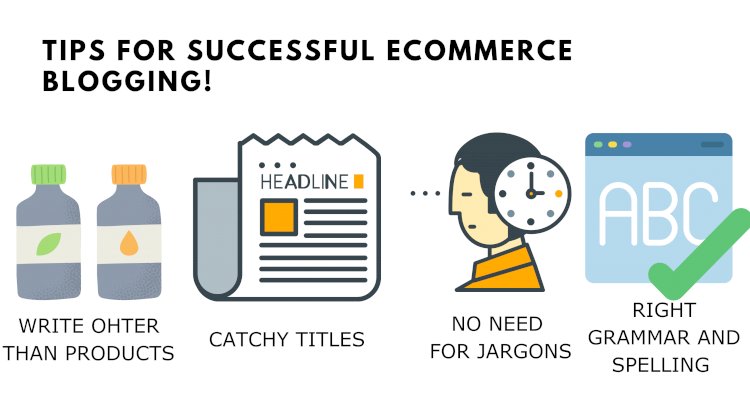
Once you start a blog for eCommerce, consider these tips for excellent results.
-
Blog about other things other than the products
As much as the purpose of blogging is to promote your eCommerce site, don't just focus on the products. On the contrary, use it to achieve other goals, including driving new traffic. Use it to captivate readers to join your email subscribers list. You can also go for content that inspires, helps, and entertains your customers. They are also ideal for building a brand for your store.
-
Use attention-grabbing titles
That's the first thing readers see about the blog and will most likely determine whether they proceed to read or not. Make sure that it is relevant to what they seek to captivate them. If it does, they will most likely continue reading it.
-
Avoid Passive Voice
Passive voice makes you use a lot of words to explain something. As a result of that, it confuses the reader since it clouds the message.
-
Correct Grammar
If you have grammatical errors, your audience may assume that you aren't to be trusted. That's why it should be a priority when eCommerce blogging lest you lose your credibility eventually.
-
Avoid Spelling Mistakes
Spelling mistakes are even worse than grammatical errors. Using their instead of there could confuse readers and might make them leave your site never to return. They are also easy to spot, which discourages readers from reading.
-
Use short sentences, paragraphs, headings, and subheadings
Short sentences improve readability hence easy to understand. Paragraphs are ways of informing readers that you are now discussing a new topic. A long block of text can also discourage a reader. Last but not least, headings and subheadings help search engines, and readers skim your site and capture the content.
-
No need for jargon
Many readers lack expertise in an area you are an expert in, and that's why they are seeking your help to understand. As a professional, avoiding jargon could make all the difference. Readers will appreciate it for sure.
-
Categorize your audience
Visitors have different needs, purchase intents, and interests. For eCommerce blogging, consider adding content for all the camps. You should target potential and existing customers with your blogs without overlooking either.
Final Words
For anyone considering eCommerce blogging, all the vital information is at their disposal. From what it is all about to whether it is necessary or not. The article also discusses the benefits of blogs for eCommerce in detail. Above all, it advises you on how to make the best use of your blog posts.








